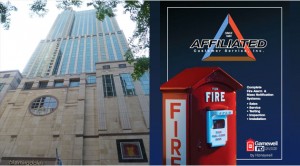 Generally, an elevator’s FEO doesn’t allow the cabs to run once activated, so a selective application usually isn’t an option. I say usually because hospitals employ a Code Blue elevator control system to override the elevator FEO in life saving situations. That’s an extra cost on a more robust elevator controller and obviously doesn’t apply here. As a solution to this application, assuming commercial grade detectors are used, we suggest programming the smoke detectors to employ verification of one minute, the maximum time allowed by NFPA 72 [Chap.23.8.5.4.1(2)]. Verification is a feature that allows nuisance particulates to disperse before activating the detector. Basically, if the detector goes into alarm, it does nothing and waits for 60 seconds then looks again. If there are still enough particulates in the sensing chamber to cause an alarm, it goes off. If not, it maintains a ‘normal’ status, but it has a heightened awareness for three minutes. If it doesn’t go back into alarm for three minutes, it goes back to sleep, no harm done. If it does, it activates immediately, without verification. Additionally, the detector can be programmed as a non-latching device so that once the ‘smoke’ clears, it self-restores and allows the elevators to resume normal operation. So if you have a burnt toast activation, once the air clears, the elevators will run again. It’s not perfect, but it’s better than having to reset the elevator recall fire panel, especially during off hours.
Generally, an elevator’s FEO doesn’t allow the cabs to run once activated, so a selective application usually isn’t an option. I say usually because hospitals employ a Code Blue elevator control system to override the elevator FEO in life saving situations. That’s an extra cost on a more robust elevator controller and obviously doesn’t apply here. As a solution to this application, assuming commercial grade detectors are used, we suggest programming the smoke detectors to employ verification of one minute, the maximum time allowed by NFPA 72 [Chap.23.8.5.4.1(2)]. Verification is a feature that allows nuisance particulates to disperse before activating the detector. Basically, if the detector goes into alarm, it does nothing and waits for 60 seconds then looks again. If there are still enough particulates in the sensing chamber to cause an alarm, it goes off. If not, it maintains a ‘normal’ status, but it has a heightened awareness for three minutes. If it doesn’t go back into alarm for three minutes, it goes back to sleep, no harm done. If it does, it activates immediately, without verification. Additionally, the detector can be programmed as a non-latching device so that once the ‘smoke’ clears, it self-restores and allows the elevators to resume normal operation. So if you have a burnt toast activation, once the air clears, the elevators will run again. It’s not perfect, but it’s better than having to reset the elevator recall fire panel, especially during off hours.
For residential applications where the cabs open into a living space, you may want to consider using sounder bases with those elevator recall system detectors as a local notification method. That gives the unit owners a heads up and allows them to clear the air around the detector like they would with a stand-alone detector. Sounder bases cost more and the installer needs to know what they’re doing, but it may mitigate subsequent complaints since the elevator recall fire system doesn’t have to notify residents. The elevators could be inoperative for a period of time without anyone knowing why, which may lead to post occupancy modifications.
The Gamewell-FCI line of panels can perform all the functions we’ve described above. Contact Affiliated Fire Systems at generowe@affiliatedinc.com or at 630.434.7900 if you have any questions or need more information.
Gene Rowe, SET


Send us a Comment